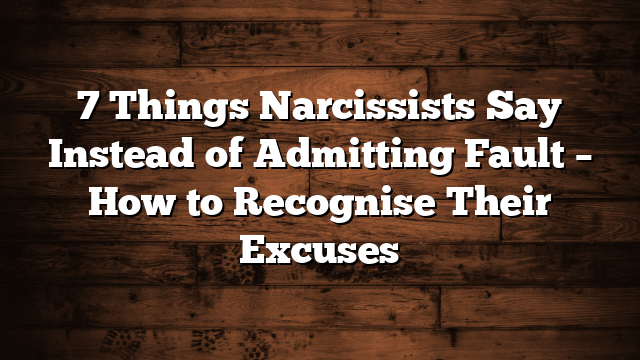7 Things Narcissists Say Instead of Admitting Fault – How to Recognise Their Excuses

7 Things Narcissists Say Instead of Admitting Fault – How to Recognise Their Excuses
7 Things Narcissists Say Instead of Admitting Fault
Narcissists rarely admit they’re wrong. Instead, they twist situations to protect their self-image, avoid responsibility, and maintain control. Understanding the excuses and phrases they use can help you identify manipulative behaviour and protect your mental and emotional wellbeing.
Behind The Mask: The Rise Of A Narcissist
Here are seven of the most common things narcissists say instead of owning up to their mistakes.
1. “It’s not my fault.”
This is the classic deflection. Narcissists rarely take responsibility for anything that goes wrong. They’ll blame you, others, or even circumstances beyond anyone’s control. By insisting that nothing is ever their fault, they maintain a sense of superiority and avoid accountability. Recognising this phrase is a key step in seeing patterns of blame-shifting.
2. “You misunderstood me.”
Narcissists often manipulate conversations to make you doubt yourself. They twist your words or intentions, creating confusion and self-doubt. When they say “you misunderstood me,” they are not clarifying—they’re controlling the narrative, ensuring that you question your perception rather than their behaviour.
3. “You’re too sensitive.”
Dismissal of feelings is a hallmark of narcissistic behaviour. If you confront a narcissist, expect this line. By labelling you as overly sensitive or reactive, they avoid acknowledging that their actions caused hurt. This tactic minimises your emotions and invalidates your experiences, leaving you questioning whether your feelings are justified.
4. “I was just joking.”
Humour becomes a tool for evasion. Narcissists frequently hide behind “jokes” to deliver criticism, insults, or hurtful comments. When confronted, they claim they were only joking to evade responsibility. The underlying tactic is to blur boundaries, making it difficult for you to assert yourself without being labelled humourless or overreactive.
5. “If you hadn’t done that…”
A narcissist rarely sees their own role in a conflict. Instead, they blame your behaviour, choices, or mistakes for their own actions. This manipulative tactic makes you feel responsible for their missteps, shifting guilt onto you while they remain unaccountable. Recognising this pattern is essential for maintaining boundaries.
6. “I didn’t mean it like that.”
Intentions are distorted to confuse and control. A narcissist may apologise superficially, but quickly qualify their words with “I didn’t mean it like that.” The real purpose is not reconciliation but making you doubt your reactions. This keeps you on edge, uncertain whether the problem lies with them or with your interpretation.
7. “You’re making a big deal out of nothing.”
Minimisation is a common tactic. Narcissists often reduce your concerns or legitimate frustrations to “nothing,” making you feel irrational for holding them accountable. This can be particularly damaging over time, eroding your confidence and making it harder to stand up for yourself.
Why understanding these phrases matters
Recognising these excuses is crucial. Narcissists thrive on confusion, guilt, and self-doubt. By identifying the phrases and behaviours they use, you can protect your emotional wellbeing, assert boundaries, and refuse to play their games. Awareness is your first line of defence against manipulation.
Protect yourself
Set clear boundaries and hold firm. Document incidents if necessary, and avoid engaging in arguments that revolve around defending yourself against distorted narratives. Seek support from trusted friends, family, or professionals who understand narcissistic behaviour.
Take action
You cannot force a narcissist to take responsibility, but you can change your response. Understanding their tactics empowers you to reclaim control over your life and emotions. The more you recognise these patterns, the less influence they have over you.
Check these out!
Behind The Mask: The Rise Of A Narcissist
15 Rules To Deal With Narcissistic People.: How To Stay Sane And Break The Chain.
A Narcissists Handbook: The ultimate guide to understanding and overcoming narcissistic and emotional abuse.
Boundaries with Narcissists: Safeguarding Emotional, Psychological, and Physical Independence.
Healing from Narcissistic Abuse: A Guided Journal for Recovery and Empowerment: Reclaim Your Identity, Build Self-Esteem, and Embrace a Brighter Future
(Sponsored.). https://betterhelp.com/elizabethshaw
Advertisements
Click on the links below to join Elizabeth Shaw – Life Coach, on social media for more information on Overcoming Narcissistic Abuse.
On Facebook.
On YouTube.
On Twitter.
On Instagram.
On Pinterest.
On LinkedIn.
On TikTok
The online courses are available by Elizabeth Shaw.
For the full course.
Click here to sign up for the full, Break Free From Narcissistic Abuse, with a link in the course to a free, hidden online support group with fellow survivors.
For the free course.
Click here to sign up for the free online starter course.
To help with overcoming the trauma bond and anxiety course.
Click here for the online course to help you break the trauma bond, and those anxiety triggers.
All about the narcissist Online course.
Click here to learn more about the narcissist personality disorder.
The narcissists counter-parenting.
Click here for more information on recovery from narcissistic abuse, and information on co-parenting with a narcissist.
Elizabeth Shaw is not a Doctor or a therapist. She is a mother of five, a blogger, a survivor of narcissistic abuse, and a life coach, She always recommends you get the support you feel comfortable and happy with. Finding the right support for you. Elizabeth has partnered with BetterHelp (Sponsored.) where you will be matched with a licensed councillor, who specialises in recovery from this kind of abuse.
Click here for Elizabeth Shaw’s Recommended reading list for more information on recovery from narcissistic abuse.



